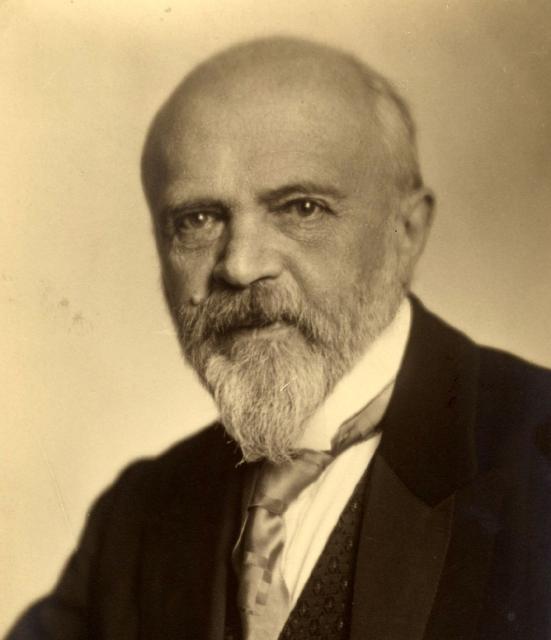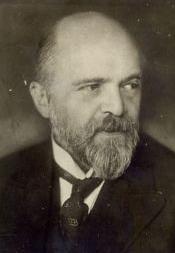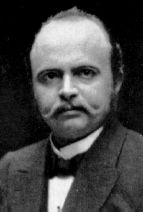<Back to Index>
- Biologist and
Philosopher Hans
Adolf Eduard Driesch, 1867
PAGE SPONSOR



Hans Adolf Eduard Driesch (28 October 1867 - 17 April 1941) was a German biologist and philosopher from Bad Kreuznach. He is most noted for his early experimental work in embryology and for his neo - vitalist philosophy of entelechy. He is also credited with performing the first cloning of an animal in the 1880s.
Driesch was educated at the Gelehrtenschule des Johanneums. He began to study medicine in 1886 under August Weismann at the University of Freiburg. In 1887 he attended the University of Jena under Ernst Haeckel, Oscar Hertwig and Christian Ernst Stahl. In 1888 he studied physics and chemistry at the University of Munich. He received his doctorate in 1889. He traveled widely on field and study trips and lecture tours, visiting Plymouth, India, Zurich and Leipzig where, in 1894, he published his Analytische Theorie der organischen Entwicklung or Analytic Theory of Organic Development. His interests encompassed mathematics, philosophy and physics as well as biology. He married Margarete Relfferschneidt: the couple had two children.
From 1891 Driesch worked in Naples at the Marine Biological Station, where until 1901 he continued to experiment and seek a theoretical formulation of his results. He inquired into classical and modern philosophy in his search for an adequate theoretical overview and ended by adopting an Aristotlean teleological theory of entelechy.
Under the influence of his teacher Haeckel, Driesch had tested the mechanistic embryological theories of another of Haeckel's students, Wilhelm Roux. By 1895 Driesch's experiments on the sea urchin embryo suggested that it was possible to remove large pieces from eggs, shuffle the blastomeres and interfere in many ways without affecting the resulting embryo. It appeared that any single monad in the original egg cell was capable of forming any part of the completed embryo. This important refutation of both preformation and the mosaic theory of Wilhelm Roux was to be subject to much discussion in the ensuing years, and caused friction among Driesch, Roux and Haeckel.
In his work on sea urchins, dividing cells of the embryo after the first cell division, he expected each cell to develop into the corresponding half of the animal to which it has been destined or preprogrammed, but instead found that each developed into a complete sea urchin. This also happened at the four - cell stage: entire larvae ensued from each of the four cells, albeit smaller than usual. Driesch's findings brought about the adoption of the terms "totipotent" and "pluripotent" cell, referring respectively to a cell that can generate every cell in an organism and one that can generate nearly every cell. Driesch's results were confirmed with greater precision by Hans Spemann.
Driesch, believing that his results compromised contemporary mechanistic theories of ontogeny, instead proposed that the autonomy of life that he deduced from this persistence of embryological development despite interferences was due to what he called entelechy, a term borrowed from Aristotle's philosophy to indicate a life force which he conceived of as psychoid or "mind - like", that is; non-spatial, intensive, and qualitative rather than spatial, extensive and quantitative.
Driesch was awarded the chair of natural theology at the University of Aberdeen, where he delivered the Gifford Lectures in 1906 and 1908 on The Science and Philosophy of the Organism - the first comprehensive presentation of his ideas. From 1909, determined to take up a career in academic philosophy, he taught natural philosophy at the Faculty of Natural Sciences in Heidelberg, becoming extraordinary professor there. In the ensuing decade he published a complete system of philosophy in three volumes, including his fundamental Theory of Order (1912) in which he proposed a three - part "doctrine of order".
In 1919 he was ordinary professor of systematic philosophy at Cologne and in 1921 professor of philosophy at Leipzig, though he was a visiting professor in Nanjing and Beijing during 1922 - 23, and in 1923 he received honorable doctor's degree from National Southeastern University (later renamed National Central University and Nanjing University) where he taught for a semester. He taught at the University of Wisconsin (1926 - 27) and in Buenos Aires (1928). In 1933 he was removed from his Leipzig chair and prematurely placed in emeritus status by the Nazi administration, the first non - Jewish academic to be thus expelled, because of his pacifism and open hostility to Nazism. He became interested in parapsychology and published on such phenomena as telepathy, clairvoyance, and telekinesis.
Driesch developed a deep interest in Psychical Research and Parapsychology. In 1931, he published a methodology of parapsychological research (in German) and in 1933 he published a book on the topic titled Psychical Research: The Science of the Super - normal. From 1926 - 1927 he served as the vice president of the Society for Psychical Research.